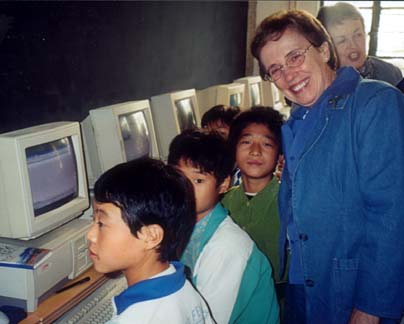

|
China Focus
Marilyn B. Lee |
COURTESY MARILYN LEE
Hawaii State Rep. Marilyn B. Lee, who visited several schools for migrant children in Shanghai, poses with students in a computer lab.
U.S. expertise can help
China cope with its
rapid developmentOverwhelming, mind-boggling and unbelievable describe some of my feelings about China when I think back on a recent trip to the southeastern coast as an Eleanor Roosevelt Fellow. U.S. Consul General Ed Dong, stationed in Guangzhou, refers to the area as the "center of the recapitalization of China" and the "center for the West to establish its relationship with China."
Everywhere we visited, bulldozers and cranes were in constant motion -- and, not surprisingly, the standard of living for many Chinese has dramatically increased from 10 years ago. Traffic congestion now is common and car ownership is becoming possible for many citizens.
The Asian Wall Street Journal reported last month that China's rapid growth is outpacing the world's commodity supply capacity and that the market for raw materials in China is driving global prices higher. To satisfy the need for copper, for example, the Chinese are importing French francs and melting them down.
"Hawaii firms are exporting their expertise to China as demand grows there for luxury and resort housing," according to an Oct. 20 story in the Star-Bulletin. Among these firms is AM Partners, which has developed villas in Shanghai where per-unit rents range from $12,000 to $15,000 and the units sell out rapidly at prices ranging from $400,000 to $660,000.
Chinese tourists are seen as a potential source of revitalization for stagnant visitor markets. States like Hawaii are drooling over the potential influx of high-end Chinese tourists known to spend more than those from Japan or Western nations.
The Hong Kong economy has revived, thanks to Chinese tourists -- 6.8 million last year and almost 8 million this year. They left behind some $5 billion to $8 billion in Chinese currency, which -- officially nonconvertible -- now appears on the boards of the ubiquitous Hong Kong money changers. The free market triumphs again!
Unbridled development does have its downside. Travel in China is stressful. The air is oppressive, dusty and smoky at times, and tap water is not potable. Despite the "one child" policy, the population density strains the limits of public facilities, and the disparity between the haves and the have-nots is startling. Although there is a growing middle class, many Chinese citizens still eke out a subsistence that does not differ much from that of their ancestors.
The result of rapid development has been the migration of millions of people from the countryside to the cities in search of work. Most of the migrants are 18-30 years old. If they work in factories, they may be able to live in dormitories provided by an employer, but families that migrate face severe challenges. It is estimated that 30 million migrants live in Guangdong Province alone.
Since they are not official residents, the migrants have little access to social services, health care and education. In the eyes of the government they simply don't exist, although a growing awareness of their presence is encouraging the government to establish some factories and large projects in rural areas to discourage migration.
My group visited a private school for the children of migrant workers. The children were using computers and studying English in the primary grades. However, the tuition for this school is 380 yuan per semester. A Portland Group study revealed that a typical Chinese worker might earn 2,000 yuan in 4 months (about $200).
We listened to speakers from the fledgling social service sector decry the practices of some industries, including well-known American companies, that encourage extensive overtime for workers but provide few health safeguards and pay low salaries. The sweatshops of Dickens' era are no myth in China, and the harm from poor environmental controls may be only starting to appear.
There is hope, and that hope was the single most positive attribute of the people we met. Things are better now, they said, and their future will be wonderful.
America has much to offer the Chinese besides our expertise in development, tourism and technology. States can provide expertise in social and human services and labor management, areas in which the Chinese have not excelled. We heard speakers from the new movement called "social entrepreneurism" describe a concept in which the welfare of the people can be synonymous with growth and development channeled in the correct way.
The University of Hawaii will send a team to Iraq soon to assess the needs of Mosul University. Why couldn't such teams be sent to China? In addition, states should make it their business to be aware of the good corporate citizens in China -- and the bad.
There is no question that China's lack of environmental controls is affecting the world environment. Particulate matter from Chinese factories is even reaching the Hawaiian islands.
The "sleeping giant" has arisen. Traveling in China has convinced me that this calls for cooperation, sharing and mutual caring.
Marilyn B. Lee is the majority floor leader of the Hawaii House of Representatives. She represents the 38th District (Mililani, Mililani-Mauka).
